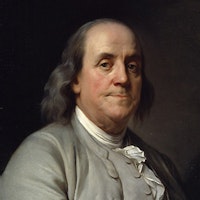I never doubted the existence of the Deity; that he made the world and govern’d it by his Providence; that the most acceptable service of God was the doing of good to men; that our souls are immortal….
I never doubted the existence of the Deity; that he made the world and govern’d it by his Providence; that the most acceptable service of God was the doing of good to men; that our souls are immortal….
Benjamin Franklin

The Doing of Good
Topic: Society & Civil Religion
“I never was without some religious principles. I never doubted, for instance, the existence of the Deity; that he made the world and govern’d it by his Providence; that the most acceptable service of God was the doing of good to men; that our souls are immortal; and that all crime will be punished, and virtue rewarded either here or hereafter. These I esteemed the essentials of every religion; and, being to be found in all the religions we had in our country, I respected them all, ‘tho with different degrees of respect, as I found them more or less mix’d with other articles, which, without any tendency to inspire, promote or confirm morality, serv’d principally to divide us, and make us unfriendly to one another.”
Benjamin Franklin FRS FRSE (January 17, 1706 - April 17, 1790) was an American polymath and one of the Founding Fathers of the United States. Franklin was a leading author, printer, political theorist, politician, freemason, postmaster, scientist, inventor, humorist, civic activist, statesman, and diplomat. As a scientist, he was a major figure in the American Enlightenment and the history of physics for his discoveries and theories regarding electricity. As an inventor, he is known for the lightning rod, bifocals, and the Franklin stove, among other inventions. He founded many civic organizations, including Philadelphia's fire department and the University of Pennsylvania.
Autobiography
Franklin, Benjamin. “The Autobiography of Benjamin Franklin/Section Thirty Five.” Wikisource, the Free Online Library.

Benjamin Franklin
Theme: A Vision of America
Copyright © 2017 – 2026 LuminaryQuotes.com About Us

Robert Bellah, Benjamin Franklin and the American Civil Religion
What we have, then, from the earliest years of the republic is a collection of beliefs, symbols, and rituals with respect to sacred things and institutionalized in a collectivity. This religion – there seems no other word for it – while not antithetical and indeed sharing much in common with Christianity, was neither sectarian nor in any specific sense Christian…. Rather, the civil religion expressed what those who set the precedents felt was appropriate under the circumstances. It reflected their private as well as public views. Nor was the civil religion simply “religion in general.” While generality was undoubtedly seen as a virtue by some, as in the quotation from Franklin above, the civil religion was specific enough when it came to the topic of America. Precisely because of this specificity, the civil religion was saved from empty formalism and served as a genuine vehicle of national religious self-understanding.
— Robert N. Bellah [Civil Religion in America (Beyond Belief: Essays on Religion in a Post-Traditionalist World, Berkeley: University of California Press, 1991)].
Additional Benjamin Franklin Quotes
“God grant, that not only the Love of Liberty, but a thorough Knowledge of the Rights of Man, may pervade all the Nations of the Earth, so that a Philosopher may set his Foot anywhere on its Surface, and say, ‘This is my Country.'”
— Benjamin Franklin [Letter to David Hartley (December 4, 1789); reported in Albert H. Smyth, ed., The Writings of Benjamin Franklin (1907), Volume 10, p. 72].
“As to Jesus of Nazareth, my Opinion of whom you particularly desire, I think the System of Morals and his Religion, as he left them to us, the best the world ever saw or is likely to see; but I apprehend it has received various corrupt changes, and I have, with most of the present Dissenters in England, some Doubts as to his divinity; tho’ it is a question I do not dogmatize upon, having never studied it, and I think it needless to busy myself with it now, when I expect soon an Opportunity of knowing the Truth with less Trouble.”
— Benjamin Franklin [An Exploration of a Life of Science and Service (1938) by Carl Van Doren, p. 777].
“The Faith you mention has doubtless its use in the World. I do not desire to see it diminished, nor would I endeavour to lessen it in any Man. But I wish it were more productive of good Works, than I have generally seen it: I mean real good Works, Works of Kindness, Charity, Mercy, and Publick Spirit; not Holiday-keeping, Sermon-Reading or Hearing; performing Church Ceremonies, or making long Prayers, filled with Flatteries and Compliments, despis’d even by wise Men, and much less capable of pleasing the Deity. The worship of God is a Duty; the hearing and reading of Sermons may be useful; but, if Men rest in Hearing and Praying, as too many do, it is as if a Tree should Value itself on being water’d and putting forth Leaves, tho’ it never produc’d any Fruit.”
— Benjamin Franklin [Letter to Joseph Huey (6 June 1753); published in Albert Henry Smyth, The Writings of Benjamin Franklin, volume 3, p. 145].
Whilst the last members were signing it Doctor Franklin looking towards the President’s Chair, at the back of which a rising sun happened to be painted, observed to a few members near him, that Painters had found it difficult to distinguish in their art a rising from a setting sun. “I have,” said he, “often and often in the course of the Session, and the vicissitudes of my hopes and fears as to its issue, looked at that behind the President without being able to tell whether it was rising or setting: But now at length I have the happiness to know that it is a rising and not a setting Sun.”
— Benjamin Franklin [At the signing of the United States Constitution, Journal of the Constitutional Convention (17 September 1787)].
At the close of the Constitutional Convention of 1787, a Mrs. Powel of Philadelphia asked Franklin: “Well, Doctor, what have we got—a Republic or a Monarchy?” Franklin replied: “A Republic, if you can keep it.”
— Dr. James McHenry [From a note of uncertain date published in The American Historical Review, v. 11, p. 618.].
“Savages we call them, because their manners differ from ours, which we think the perfection of civility; they think the same of theirs… Having few artificial wants, they have abundance of leisure for improvement by conversation. Our laborious manner of life, compared with theirs, they esteem slavish and base; and the learning, on which we value ourselves, they regard as frivolous and useless.”
— Benjamin Franklin, [Remarks concerning the ‘Savages’ of North America, Dublin, (printed for L. White, 1784)].